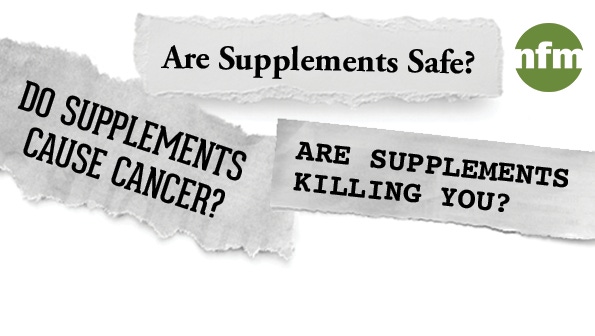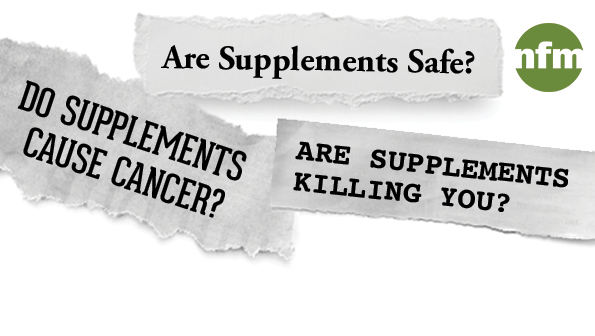

Supplement safety is the topic du jour for mainstream media, with headlines linking supplements to cancer, scandals, improper use and even death. These scary health headlines grab attention, but, unfortunately, they do little to deliver sound advice to customers—especially those who don't have time to read the full article, understand any biases or have the skills necessary to properly interpret complicated health studies. Superficial reporting creates confusion and, even worse, a spiral of skepticism about the health industry.
We asked Ashley Koff, R.D., a registered dietitian and nutrition consultant, to weigh in on the state of health reporting, how to answer customer questions related to supplements and how to interpret the latest scary health headlines that link the use of supplements to cancer based off this article by ScienceDaily.
Natural Foods Merchandiser: How can readers differentiate between a trustworthy news headline and one which has been complicated or oversimplified? How can customers use and interpret the information in health articles to better their own health?
Ashley Koff, RD: Tough question. First: Use your common sense — if it sounds too good to be true, it is. Second: Nutrition information is rarely black or white, so avoid recommendations that categorize things that way. Third: Recognize that mass outlets (ie the media) don’t provide personalized information or prescriptions. To that end, always follow up on something you hear or read with a source that can help you personalize that information. That’s what I do for patients, so your doctor, your dietitian or your healthcare practitioner is a good resource for you. (Note the use of “your” in that last sentence—it's not wise to take the advice that someone else’s practitioner gave them, specifically.)
NFM: What does better nutrition have to do with supplements and cancer risk?
AK: Everything. When we hold our supplements to the same standards we hold (or should hold) our food, we help people make the right choices. Better choices lead to improved health. While we don’t know how to cure cancer, we do have a good understanding of many things that increase the risk of cancer. Those risks should be limited or avoided as much as possible. Additionally, a real risk for cancer is the body not being healthy enough to withstand treatments and to heal itself, so better nutrition can play a major role here. Supplements, on the other hand, can be tricky in general, but even more so when cancer and cancer treatment(s) are involved. It’s critical that you inform your practitioner of what you’re taking—and that you adhere to their recommendations because, ultimately, it can impact the success of your treatment as well as your long-term healing.
NFM: What do you believe is the biggest problem in the supplements industry?
AK: The junk food-ification of supplements is not just unhealthy, it's extremely dangerous. Unlike food, where the greatest risk is typically getting too many calories and insufficient nutrients, the risk with supplements is excessive nutrient intake. Excessive nutrient intake can turn a helpful nutrient into a harmful substance as well as create conditional deficiencies of other nutrients when one is overemphasized in relation to another. I do advise my patients that they are better off investing in quality food rather than taking a poor quality supplement, BUT I also see the healing power of quality supplements on a daily basis. As a nutrition professional, it's my job to educate on both.
NFM: What are the proper uses for supplements?
AK: There are four proper and healthful uses for supplements:
1. To help fill nutritional gaps that can occur when life happens. In such a situation, despite a person's best efforts to eat a nutrient-dense diet, he/she doesn’t get enough of the important nutrients required, so supplements can help get them back to where they need to be.
2. When a person's age, life stage or dietary choices increase their need for certain nutrients.
3. When, for health reasons or choices, a person's dietary intake excludes key nutrients they need for better health.
4. For therapeutic use, as advised by a knowledgeable practitioner, who has assessed a person's diet, as well as their medical needs, and then suggested supplemental nutrition as part of that individual's better health prescription.
NOTE: There are many other poor reasons people take supplements: because of something they read in an non-professionally sourced book or article, or because an uneducated salesperson, friend or celebrity makes it seem like their life and health will be better if they pop a certain pill or drink some powder.

Appearing at NBJ Summit: Ashley Koff July 20-23, Dana Point, CAFind more information here
NFM: The article by ScienceDaily points to excessive nutrient intake as having a link to cancer. How can people implement this information to help them use supplements for their health advantage?
AK: The first thing to note is that more is not always—and almost never—better when it comes to ingredients in a supplement. Rarely do you need to supplement with 100 percent of the daily amount of a nutrient, and even less frequently is there a need to supplement in excess of 100 percent of the Recommended Dietary Allowance (RDA) of a nutrient. We get our nutrients primarily from food, then we supplement. Ideally, you’ll work with someone who can help you navigate the best choices for you, personally. One key area to review is your current food and beverage intake—on average—to reveal where nutritional gaps may be improved with supplemental food. If a supplement’s advertisement claims that it contains ten times as much of a nutrient than a comparable whole food does, then (hint, hint) that’s considered excessive. Also, when a nutrient is available in a highly absorbable form it can provide greater efficacy (the maximum response achievable) than a less well-absorbed nutrient in much higher amounts. Remember that the milligrams or weight on the package just means that’s the amount the product contains by weight, NOT its efficacy.
NFM: Is it just as risky to be deficient in nutrients as it is to take too much?
AK: Absolutely. But the body is going to give you a lot of signs when you’re deficient in a nutrient(s), which isn’t often the case when you’re getting excess of a nutrient(s). We can ignore those signs, of course, but most of us will listen up if they persist.
NFM: Some third-party seals do exist on supplement labels (such as USP or DSVP) to help shoppers make safe decisions—and you created a list of your own approved supplements (AKA for Ashley Koff Approved). We understand that you never receive money for the use of your seal, and that it's based on your own experience. Why doesn't a single third-party seal exist to help shoppers know a supplement has been reviewed?
AK: There’s more to come. We’re working on it!
NFM: How can retailers help shoppers make safe decisions about supplements?
AK: That’s the million-dollar question and why I’m working on a project to enable retailers to provide guidance about supplements. In the same way that Seafood Watch has done an excellent job teaching retailers and consumers the “red, yellow, and green” choices of sustainable seafood: we need that for supplements. The model is tough, because creating and digesting learning resources is time consuming. Most of the time, retail resources come directly from a manufacturer or an expert funded by a company. This isn’t necessarily a bad thing, but remember that there’s an inherent bias to factor in. The retailer can seek out education directly from local practitioners. I know of one retailer who has two employees whose job it is to vet every product they carry for safety and a third-party review, such as AKA.
NFM: What advice can you offer retailers who have customers who are scared about the latest news about excessive supplement use and cancer risk?
AK: Share the information above and emphasize the four purposes and proper uses of supplements. Then encourage him/her to talk to their healthcare provider to discuss what he/she is taking (or considering taking) and if there are any risks associated with that supplement or product and someone of their age, gender and life stage.

What questions do you have about supplements in light of recent headlines?
About the Author(s)
You May Also Like
.png?width=700&auto=webp&quality=80&disable=upscale)




